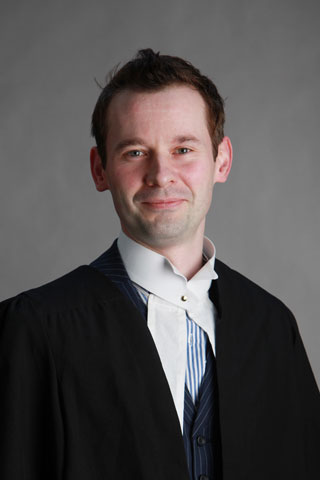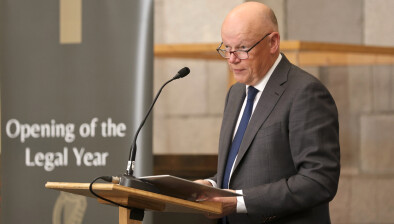Supreme Court ruling could ‘encourage’ legislative intervention on burden of proof, conference hears

Professor Liz Heffernan
A recent Supreme Court ruling could encourage legislative intervention in the allocation of the burden of proof, raising “the spectre of interference” with the presumption of innocence, a legal academic has warned.
Professor Liz Heffernan delivered a lecture at the second Irish Supreme Court Review (ISCR) conference on DPP v Forsey [2018] IESC 55 and statutory presumptions affecting the burden of proof.
Noting that “the presumption of innocence has a legendary pedigree in the Irish system of criminal justice”, she said that courts wrestle uncomfortably with the reconciliation of legislation with the presumption of innocence.
After Forsey, which was handed down last November, a legal burden is likely to arise “only in circumstances analogous to the exceptional defences of insanity and diminished responsibility”.
She noted that the reading down of reverse burden provisions as imposing “no more than an evidential burden in borderline cases” could lead to legislation altering the burden of proof “through the back door”.
Professor Heffernan noted that Forsey may theoretically “bolster the rights of the defence” if it instructs the Oireachtas that it “may encroach on the presumption of innocence only in truly exceptional circumstances”, but warned that an alternative effect could be to encourage legislative intervention in the allocation of the burden of proof.
She questioned whether any statutory modification of the burden of proof may “raise the spectre of interference” with the presumption, and whether such alterations may always warrant analysis of the “justifiability of any encroachment on protected rights”.
Professor Heffernan, associate professor of law at Trinity College Dublin, was among 12 speakers at Saturday’s ISCR conference, hosted by TCD School of Law and sponsored by Pinsent Masons.

Professor Imela Maher
The keynote speech by Professor Imelda Maher, dean of law and inaugural Sutherland full professor of European law at UCD, considered the role of national courts as the ordinary courts of the EU.
There were 22 EU cases in the Supreme Court in 2018, she noted. Commenting on recent changes in jurisprudence, Professor Maher said that while lawyers often think of the evolution of law in Darwinian terms of “the survival of the fittest”, she counselled that change in law does not always equal progress or improvement.
Dr Noel McGrath delivered a lecture on the circumstances in which a court will appoint a receiver by way of equitable execution following ACC Loan Management v Rickard [2019] IESC 29.
Welcoming the judgment, he noted that the case is one “which excises one of the distinctions between law and equity from Irish law. Post Rickard it is of no importance whether a property right is legal or equitable in nature when it comes to deciding whether it can be made the subject of receivership in aid of execution.”

Professor Fiona de Londras
Professor Fiona de Londras, chair of global legal studies at Birmingham Law School, spoke on P v Minister for Justice and Equality [2019] IESC 47.
The Irish Nationality and Citizenship Act 1956 allows the Minister for Justice to determine applications for naturalisation. While the Act provides for mandatory considerations, it is in the absolute discretion of the Minister to decide whether or not to issue a certificate of naturalisation. The Minister attempted to justify the non-provision of reasons to P on national security grounds. In two judgments, the Supreme Court allowed the appeal and remitted the decision to the Minister for reconsideration.
In her talk, Dr de Londras counselled against the introduction of a special advocate system as found in the UK. Tony McGillicuddy BL questioned whether special advocates might be utilised to challenge the validity of privilege over opinion evidence on membership of illegal organisations in the Special Criminal Court. Dr de Londras said that it might marginally improve things, but that much could be done to improve the rights of accused persons generally before the Special Criminal Court.

The conference took place at Trinity College Dublin
Professor Desmond Ryan BL discussed Nano Nagle v Daly [2019] IESC 63 on the extent of the obligation on employers to adopt appropriate measures in the context of reasonable accommodation under the Employment Equality Act.

Professor Desmond Ryan BL
Nano Nagle contains important guidance regarding the decisions of such bodies, particularly having regard to the need to provide reasons for the types of redress ordered.
Dr Ryan argued that the case is likely to have a lasting impact on the decision-making approaches of statutory bodies both in the employment law sphere and beyond.
An employer’s duty is to take “appropriate measures” to enable a disabled person to work unless this would impose a disproportionate burden. Appropriate measures mean “effective and practical” measures, including relating to distribution of “tasks”. An employer cannot deploy the term “tasks” to divide up the term “duties” with the effect of rendering an employee’s duty incapable of performance.
Dr Ryan remarked that the Labour Court, to which the matter is again remitted, has both a “difficult task and an important duty.”

Dr Áine Ryall
Dr Áine Ryall delivered a paper on Fitzpatrick and Daly v An Board Pleanála [2018] IESC 60 and [2019] IESC 23, noting that the substantive judgment is a “significant addition to the Supreme Court’s environmental jurisprudence”. Dr Ryall submitted that the judgment delivered a “welcome measure of certainty” for decision makers and developers on certain key aspects of EIA law in the specific context of multi-stage developments.
Dr David Prendergast discussed DPP v Brown [2018] IESC 66 and its effect of limiting consent in criminal law. He noted that a possible implication of the majority judgment that illegality negates consent in assault, if applied strictly, could mean that two persons who shake hands to agree to a criminal course of action are, their consent to shake hands vitiated by the illegality of the enterprise, guilty of assault.
A questioner proposed that if the logic of the judgment was applied to sexual offences, whether a person who buys sex would be, as a result of the consent being linked to the illegal purchase of sex and therefore negated by illegality, guilty of rape. Dr Prendergast noted that it is hard to offer prognostication on the effects of the judgment.

Dr Mark Coen
Dr Mark Coen delivered a lecture critiquing Sweeney v Ireland [2019] IESC 39, arguing that the “troubling judgment” means that “the right to silence is not respected and vindicated when its exercise is penalised and that, regardless of how the judgment characterises it, is what the use of s.9(1)(b) allowed in Sweeney”. He professed that the “overall tenor” of the judgment is one of “deference to state interests”.
Dr Fergus Ryan spoke on PP v Judges of the Dublin Circuit Court [2019] IESC 11 and the different approach taken by the Court on the prosecution of a sexual offence under the repealed Criminal Law Amendment Act 1885 from that taken by the Court in the CC case.
Brian Murray SC, whose appointment to the Court of Appeal was approved last week, delivered a talk on the recent Kerrins and O’Brien judgments, and the clarity that they provide in setting out the boundaries of parliamentary privilege and the separation of powers.
Pinsent Masons partner Ann Henry delivered the closing remarks, noting the increasing interest of international clients in litigating in Dublin.








